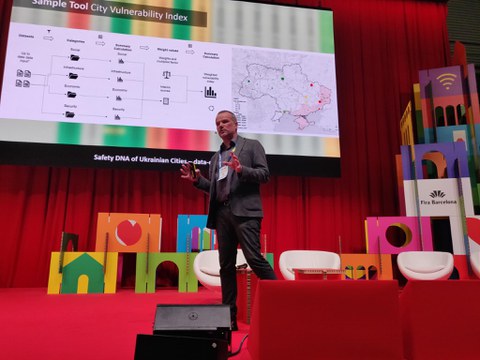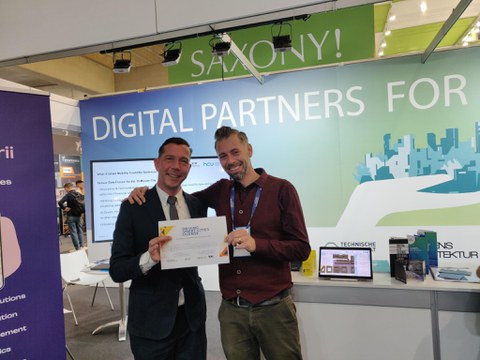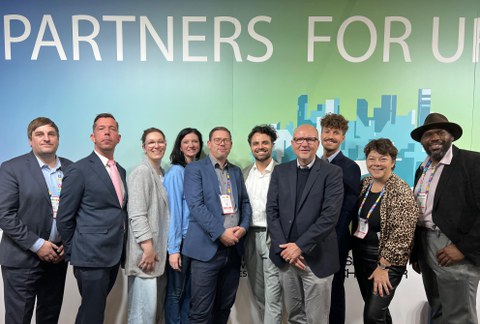Nov 12, 2025
"Partners for Urban Resilience" - WISSENSARCHITEKTUR at the Smart City Expo World Congress 2025 in Barcelona
For the third time in a row, WISSENSARCHITEKTUR - Laboratory of Knowledge Architecture presented its research topics at the world's largest trade fair for smart city developments. Visitors from business, science and local government were able to find out about strategy development and impact research. The TU Dresden research team placed its work in a larger context: the cooperation with partners from Dresden and Hamburg for urban resilience.
Prof. Noennig: "Resilience is one of the most important aspects of the smart city"

Prof. Jörg Rainer Noennig at a stage talk about the relevance of resilience for a modern city.
Prof. Dr.-Ing. Jörg Rainer Noennig, Head of TUD-WISSENSARCHITEKTUR and Professor of Digital City Science at HafenCity University Hamburg (HCU), picked up on the joint motto "Digital Partners for Urban Resilience" in his stage talk. He considers resilience to be one of the most important aspects of a smart city. Natural and man-made disasters repeatedly put urban societies under shock. This increases the need for prevention and response. According to Noennig, smart cities with smart technologies not only have the ability to react faster and better to crises - but also to learn from them ("Crisis as a Resource") and ultimately emerge stronger.
Smart-City-Tool for Prognosis and Participation
The partners gathered at the stand (e.g. HAWICC - Hanseatic Wireless Innovation Competence Center or integrationWorks GmbH) address such "smart resilience" at various levels: from the building to the regional scale. In the Model Project Smart City Dresden, which is being led by WISSENSARCHITEKTUR as part of the accompanying and synthesis research, a digital platform/app for forecasting heavy rainfall events or a maintenance management system for the condition of roads are also being developed. Participation processes in municipal decision-making can strengthen social cohesion and utilize the potential of "swarm intelligence". A "Smart Participation Toolbox" is intended to provide digital tools for surveys. The start-up "Scenerii " - a co-design tool for surveys for construction projects - which emerged from WISSENSARCHITEKTUR was also present at the booth.
Strategy Crash Course

Crash Course passed! Paul Stadelhofer (WISSENSARCHITEKTUR, left) presented a participant with the "Smart City Driver's Licence".
Dr. Paul Stadelhofer (WISSENSARCHITEKTUR) invited visitors to a "Smart City Strategy Crash Course". In a short version of the Dresden Smart City Co-creating a strategy process, the aim was to build a roadmap for the process and identify relevant stakeholders for the participation formats. At the end, participants received a "Smart City Driver's License". Stadelhofer also presented the model developed by the research team for analyzing the impact of smart city projects. The model relates consensus-based indicators from Smart City guideline documents in order to describe impact and identify optimization potential.
Developing a Smart City terminology with the German Smart City Association
Another sub-project initiated from the Smart City Dresden pilot project, which was presented in Barcelona, is a collaboration between WISSENSARCHITEKTUR and the German Smart City Association. Together, they are working on a systematic terminology of smart city terms. The aim is to make it easier for scientists and municipal employees to find a common language for funding applications and cooperation amidst the often blurred terminology.
For the participating institutions at the joint TUD/HCU booth, the expo world congress was a great success. All offers were well received and valuable contacts were made with colleagues and municipalities.
27,000 participants - 1,000 exhibitors - 138 countries
For over 10 years, the Smart City EXPO World Congress, organised by Fira de Barcelona, has been bringing together leading representatives of the most innovative companies, governments and organisations. Over 1,000 exhibitors and representatives from 138 countries took part to share their projects and find solutions to make cities more sustainable, efficient and liveable.

